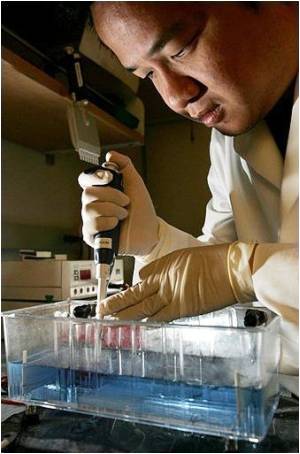
"A cell is an information processing system and cancer cells make decisions that promote their growth, so we are striving to understand how these cells make mathematically-based choices based on inputs, processing, and outputs," says lead investigator Robert Clarke, PhD, DSc, a professor of oncology at Lombardi and GUMC''s newly appointed Dean for Research.
The model, which is being built in modules, is designed to understand estrogen signaling in breast cancer cells, and by extension, why some cancer cells are susceptible to endocrine therapy while others are not. The estrogen hormone drives over half of the 180,000 cases of invasive breast cancer diagnosed each year, yet endocrine therapies designed to shut down this growth pathway are not as successful as simpler, human-derived models would have predicted, Clarke says.
"We need an engineering approach to a biological problem, and this is a very novel, and promising, start," says Clarke. "No one has built a model of breast cancer cell fate decision making like this before."
Working with him are Louis M. Weiner, M.D., director of the Lombardi Comprehensive Cancer Center; first author John J. Tyson, Ph.D., a professor of computational cell biologist at Virginia Tech; and William T. Baumann, Ph.D., associate professor of electrical and computer engineering at Virginia Tech. Tyson and Baumann have assembled a team of graduate students and postdoctoral researchers to assist in the modeling project.
"We are providing a roadmap of how a modeler might capture, in mathematical form, the molecular events controlling cell growth, proliferation, damage responses, and programmed cell death," says Tyson. "The value of this enterprise will be measured ultimately by new insights provided by the model into the logic and functionality of estrogen-receptor signaling and by the effectiveness of the model as a tool for experimental prediction and design."
Advertisement
"The hallmark of cancer cells is that they are making decisions that are right for them, not for the survival of the human organism, so we need to understand those choices," Clarke says.
Advertisement
To that end, the investigators have already begun to model separate modules that computers can track in terms of the dynamic consequences of multiple and often conflicting interactions. These include "decision modules" (cell cycle and apoptosis), "stress modules" (autophagy and unfolded protein response), and the "signal processing modules" (estrogen receptor and growth factor signaling transduction networks).
Clarke says that a lot of "wet lab work" data from Lombardi laboratories measuring how changes in gene and protein expression affects response to endocrine therapy is being transferred into the model, along with published information from other institutions.
Not only does the model have the potential to explain why certain subtypes of breast cancer respond or become resistant to endocrine therapy, it could be used to help test potential new therapies, he says.
"If we tweak some gene in the model and all the breast cancer cells die, we can go back to the lab and test if that actually occurs," Clarke says. "That means that once we understand the decisions that these cancer cells are making, we have an efficient way of developing drugs or combination of drugs."
"The hard work is yet to be done, but it is just a matter a time before an effective, integrated model of regulatory networks in breast cancer cells is informing the next wave of experiments and therapies," says Tyson.
Yue Wang, the Grant A. Dove Professor of Electrical and Computer Engineering; Chun Chen and Iman Tavassoly, a Ph.D. students in the Genetics, Bioinformatics, and Computational Biology program at Virginia Tech; and Anael Verdugo, a National Science Foundation postdoctoral fellow in biological sciences at Virginia Tech, are also co-authors on the paper.
About Georgetown Lombardi Comprehensive Cancer Center
The Lombardi Comprehensive Cancer Center, part of Georgetown University Medical Center and Georgetown University Hospital, seeks to improve the diagnosis, treatment, and prevention of cancer through innovative basic and clinical research, patient care, community education and outreach, and the training of cancer specialists of the future. Lombardi is one of only 40 comprehensive cancer centers in the nation, as designated by the National Cancer Institute, and the only one in the Washington, DC, area. For more information, go to http://lombardi.georgetown.edu.
About Georgetown University Medical Center

Georgetown University Medical Center is an internationally recognized academic medical center with a three-part mission of research, teaching and patient care (through MedStar Health). GUMC''s mission is carried out with a strong emphasis on public service and a dedication to the Catholic, Jesuit principle of cura personalis -- or "care of the whole person." The Medical Center includes the School of Medicine and the School of Nursing & Health Studies, both nationally ranked; Georgetown Lombardi Comprehensive Cancer Center, designated as a comprehensive cancer center by the National Cancer Institute; and the Biomedical Graduate Research Organization (BGRO), which accounts for the majority of externally funded research at GUMC including a Clinical Translation and Science Award from the National Institutes of Health. In fiscal year 2009-2010, GUMC accounted for nearly 80 percent of Georgetown University''s extramural research funding.
Source-Newswise















